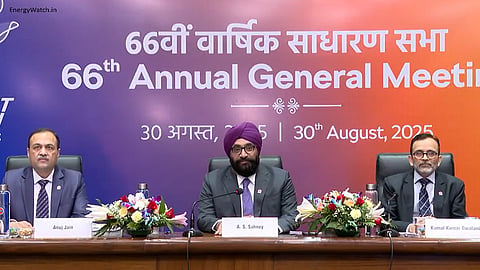

New Delhi: Indian Oil Corporation (IOC), India's largest oil company, has announced plans to invest Rs1.66 lakh crore over the next five years to boost its core operations in oil refining and fuel marketing, while also expanding into petrochemicals, natural gas, and renewable energy, according to chairman Arvinder Singh Sahney. Speaking at the company's annual shareholder meeting, Sahney detailed IOC’s strategy to increase its crude oil refining capacity from its current 80.75 million tonnes per year to 98.4 million tonnes by 2028, with significant expansions at facilities in Panipat, Gujarat, and Barauni.
Follow Energy Watch on X
The company is also working to strengthen its pipeline infrastructure, aiming to expand its network from the present 20,000 km to 22,000 km, with 21 projects underway. These initiatives include new pipeline stretches and additional storage capacity in Nepal. IOC is turning its attention to petrochemicals as a major area of growth, targeting an increase in production capacity from 4.3 million tonnes annually to over 13 million tonnes by 2030. This includes a special focus on specialty chemicals to curb import dependence and improve profit margins.
IOC continues to expand its fuel retailing footprint, presently comprising over 40,000 stations, and is enhancing its offerings with modern solutions like EV chargers, battery-swapping stations, and outlets for CNG and LNG. Sahney noted that, in addition to its core businesses, IOC is committed to investing ₹2.5 lakh crore in energy transition projects to achieve net-zero operational emissions by 2046. This includes investments in green hydrogen, Sustainable Aviation Fuel (SAF), and enlarging its renewable electricity portfolio from 1 GW to 18 GW within three years.
“Looking ahead, your company has committed around Rs 1.66 lakh crore over the next five years, with a sharp focus on petrochemicals, natural gas, and renewable energy – balancing India’s rising auto-fuel demand with the global energy transition,” Sahney stated.
For operational expansion, Sahney emphasized increased per-pump throughput, non-fuel retail initiatives, and segments like bitumen and bunkering. The company is also preparing for future opportunities by exploring LNG bunkering, coastal infrastructure, integrated shipping, and data transmission services to leverage its strengths in the rapidly changing energy landscape.
IOC currently leads the domestic LPG market with a 45 percent share and has introduced the BIS-certified Chhotu Master – a compact 5 kg cylinder and cooktop combo, launching the first ‘Chhotu Shopee’ in Ahmedabad. For industrial clients, innovative products such as XtraBoost nano-additized AutoLPG and Propane Plus are designed to deliver cleaner combustion and higher efficiency.
IOC’s Servo lubricants have expanded into 45 countries, and the company maintained market dominance in aviation fuel with a 54.5 percent share, adding new fuelling stations in Srinagar and Rewa. The natural gas business has grown by 20 percent, reaching 7.9 million tonnes per year, underpinned by fresh agreements with global suppliers. Its city gas distribution network now covers 49 geographical areas across 21 states, representing 21 percent of India’s population.
Beyond traditional energy, IOC has established a new explosives plant in Neyveli and is developing projects in Telangana and Maharashtra. In cryogenics, it has obtained government contracts and export orders, and a new facility in Dindori is set to enhance domestic manufacturing capability. “All of this is backed by strict capital discipline, ensuring that every investment creates long-term value and keeps IndianOil future-ready,” said Sahney.
Reflecting on the year, he remarked, “The year gone by reminded us that energy is never just about markets and molecules—it is shaped by the pulse of geopolitics.” Sahney highlighted the ongoing Russia-Ukraine conflict, emerging tensions in the Middle East, disruptions in the Red Sea, and increased tariffs from the United States as significant factors impacting global energy stability and market volatility.
Despite these headwinds, IOC achieved resilient results in 2024-25, with sales volumes exceeding 100 million tonnes, a 20,000 km pipeline network ensuring uninterrupted hydrocarbon movement, more than 40,000 fueling stations serving 32 million customers daily, and Indane LPG supporting 150 million kitchens. The company maintained strong positions in petrochemicals, natural gas, and exploration and production, further cementing its diverse energy portfolio.
